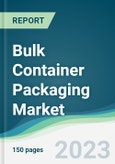The bulk container packaging market is expected to grow at a CAGR of 5.02% from US$3.826 billion in 2021 to US$5.392 billion in 2028.
Bulk container packaging refers to the practice of using large-scale containers and materials to efficiently transport and store goods in high volumes. It involves the use of robust packaging solutions such as drums, intermediate bulk containers, and pallets to withstand the rigors of handling and transportation. Bulk container packaging offers cost-effective and sustainable solutions for industries like food and beverages, chemicals, and pharmaceuticals, providing efficient logistics and minimizing packaging waste. It plays a vital role in meeting the demands of global supply chains and streamlining operations.Introduction:
The bulk container packaging market refers to the industry that focuses on the production and distribution of large-scale packaging solutions designed for the efficient transportation and storage of goods. It encompasses a wide range of industries, including agriculture, chemicals, manufacturing, and logistics. Bulk container packaging offers cost-effective, durable, and sustainable solutions, accommodating high volumes and facilitating streamlined supply chain operations.The market drivers for bulk container packaging include cost efficiency, sustainability, increased global trade, growth in e-commerce, industrialization, food and beverage industry requirements, expansion of the chemical industry, automotive and manufacturing growth, construction needs, and convenience in handling and logistics. With the growing need for streamlined logistics and sustainability practices, the bulk container packaging market plays a crucial role in meeting the demands of global supply chains.
Drivers:
- Cost Efficiency:
- Sustainability:
- Increased Global Trade:
- Growth in E-commerce:
- Industrialization and Infrastructure Development:
- Food and Beverage Industry:
- Chemical Industry Expansion:
- Automotive and Manufacturing Growth:
- Construction and Building Materials:
- Convenience and Handling Efficiency:
Products offered by key companies:
- Pactiv Evergreenlaunched its Eco-Tough line of bulk containers that are made from 100% recycled plastic and are also 100% recyclable. The containers are also designed to be lighter than traditional PET containers, which helps to reduce the amount of energy used to transport them.
- Berry Globallaunched its Clever Cap line of bulk containers that feature a unique cap design that allows them to be stacked more efficiently, which helps to reduce the amount of space they take up in landfills. The caps are also made from recycled plastic.
Positive growth in the e-commerce segment:
One segment of the bulk container packaging market that is experiencing significant growth is the e-commerce sector. The rise of online shopping has led to increased demand for efficient and cost-effective packaging solutions that can handle large volumes of goods. Bulk container packaging provides the scalability, durability, and logistical efficiency needed to support the booming e-commerce industry. It enables streamlined handling, storage, and transportation of products, reducing packaging costs and improving supply chain operations. With the continued expansion of online retail, the demand for bulk container packaging is expected to grow significantly in the coming years.The Asia-Pacific region is expected to hold a significant share:
The Asia-Pacific region is expected to dominate the bulk container packaging market share. This can be attributed to several factors, including rapid industrialization, increasing international trade, and a growing consumer base. The region is witnessing significant growth in sectors such as chemicals, food and beverages, and manufacturing, which rely heavily on bulk container packaging for efficient transportation and storage. Additionally, countries like China and India are experiencing robust economic growth and infrastructure development, further driving the demand for bulk container packaging solutions. The combination of these factors positions the Asia-Pacific region as a dominant player in the bulk container packaging market.Key developments:
- In July 2023,Turkish flavor company Aromsa partnered with Mondi to find a sustainable alternative to expensive stainless-steel containers. They developed the TankerBox, made from corrugated cardboard, as a cost-effective and eco-friendly solution for shipping. The TankerBox offers efficient discharge options and reduces residual contents, providing a sustainable packaging alternative.
- In May 2023,Tosca launched an LCA tool endorsed by the Sustainable Packaging Coalition, which assesses the environmental impact of bulk liquid transportation. This initiative aims to reduce environmental footprints in the transportation of bulk liquids.
Key Segments:
By Product
- Flexitants
- Bulk Containers
- Bulk Containers Liners
By Material
- Plastic
- Metal
- Others
By End-User
- Industrial Chemicals
- Petroleum and Lubricants
- Food and Beverages
By Geography
- North America
- United States
- Canada
- Mexico
- South America
- Brazil
- Argentina
- Others
- Europe
- United Kingdom
- Germany
- France
- Italy
- Spain
- Others
- Middle East and Africa
- Saudi Arabia
- UAE
- Others
- Asia Pacific
- Japan
- China
- India
- South Korea
- Taiwan
- Thailand
- Indonesia
- Others
Table of Contents
Companies Mentioned
- Greif Inc.
- SIA Flexitanks Ltd.
- Trans Ocean Bulk Logistics Ltd.
- SCHÜTZ GmbH & Co. KGaA
- National Bulk Equipment, Inc.
- Signode Industrial Group
- Mondi Group
- Berry Global Inc.
Table Information
| Report Attribute | Details |
|---|---|
| No. of Pages | 150 |
| Published | December 2023 |
| Forecast Period | 2021 - 2028 |
| Estimated Market Value ( USD | $ 3.83 Billion |
| Forecasted Market Value ( USD | $ 5.39 Billion |
| Compound Annual Growth Rate | 5.0% |
| Regions Covered | Global |
| No. of Companies Mentioned | 8 |








